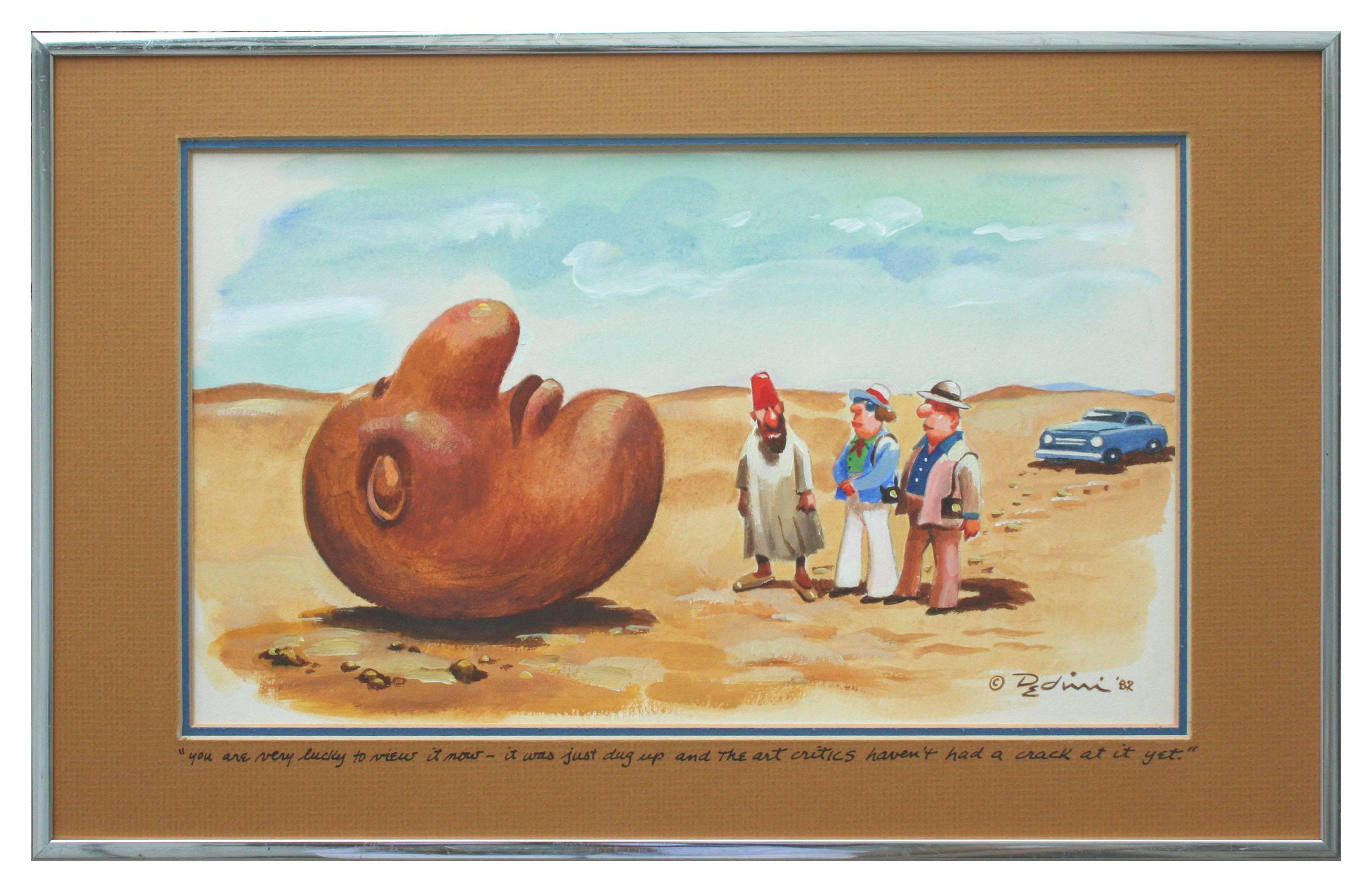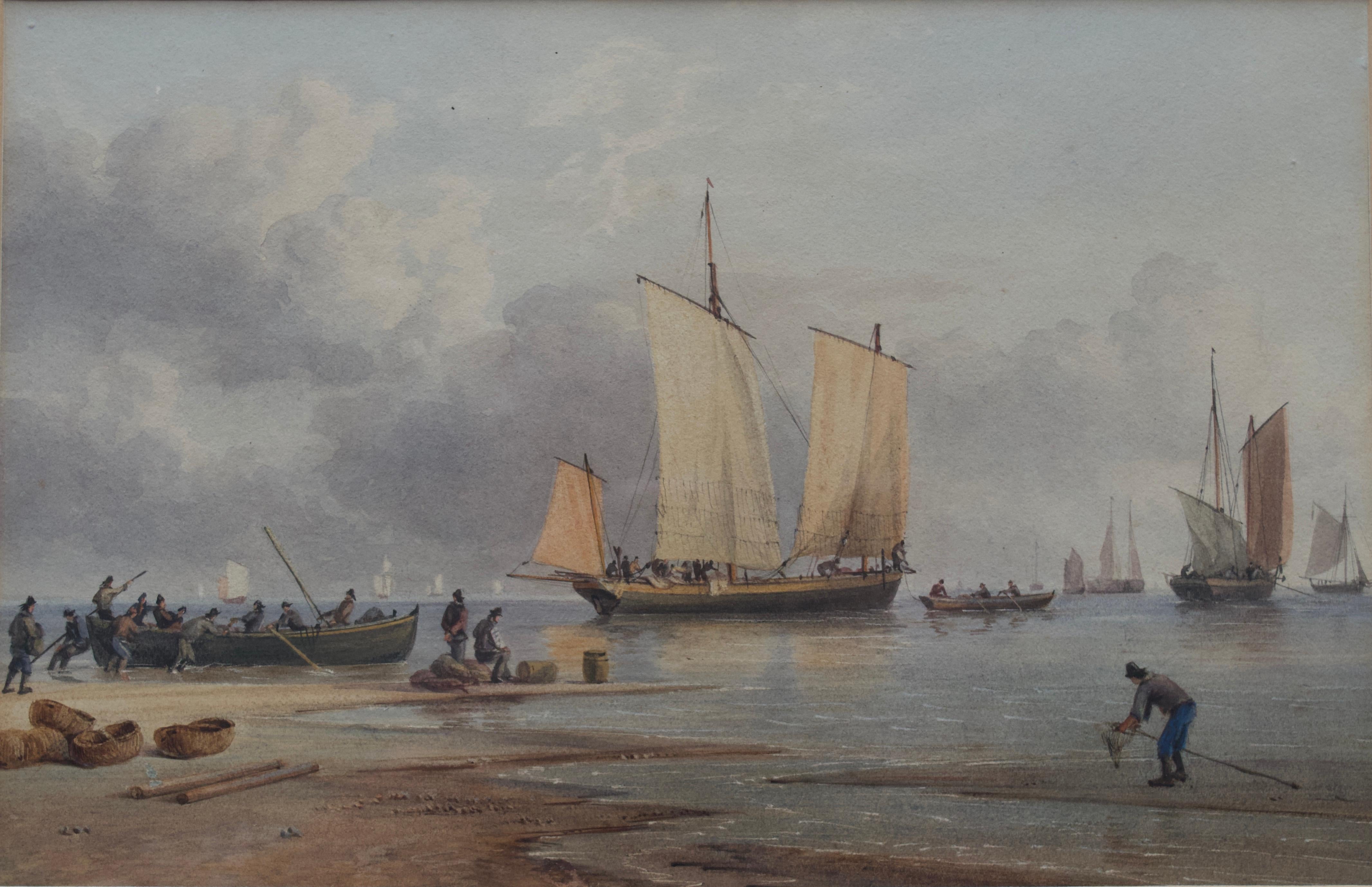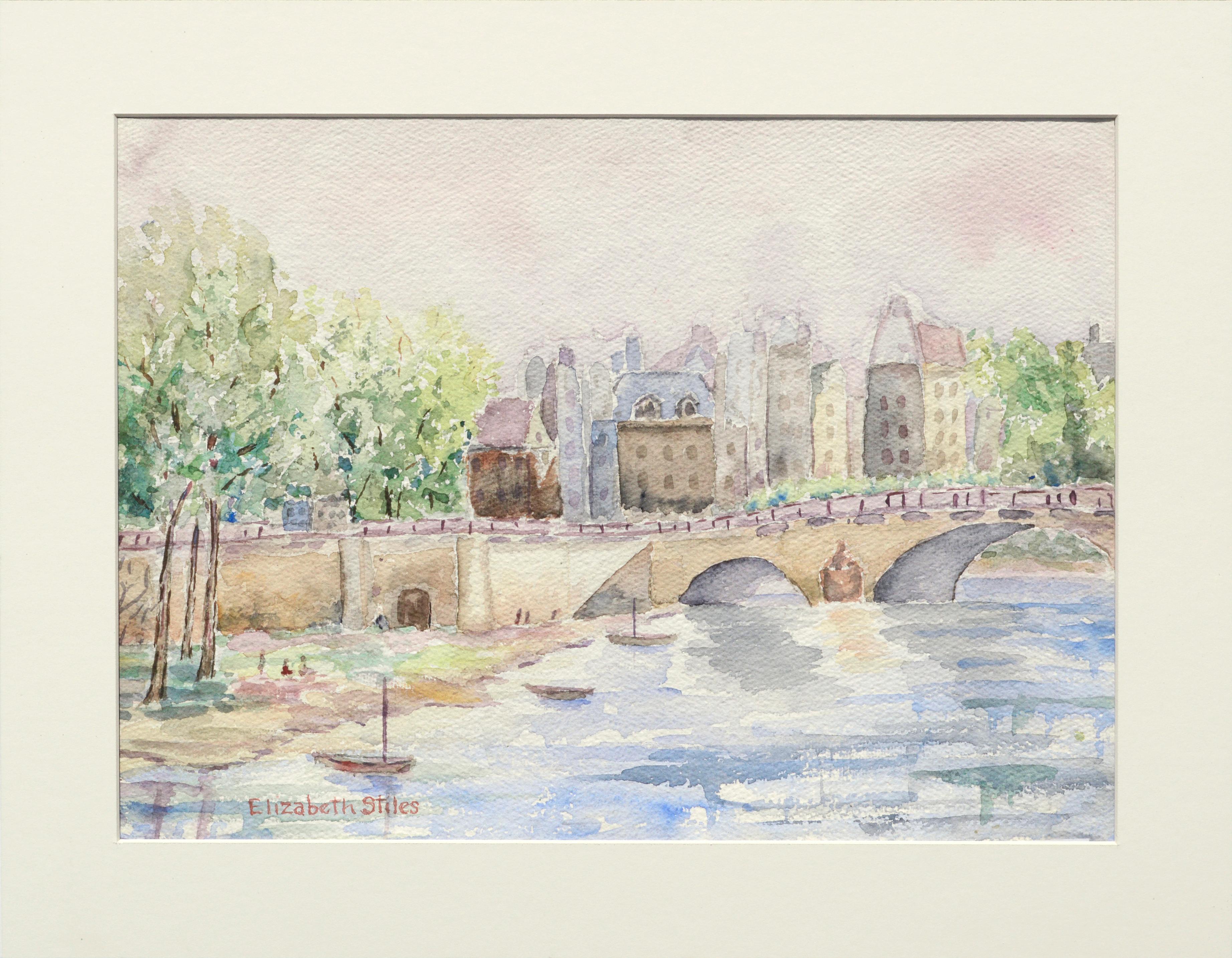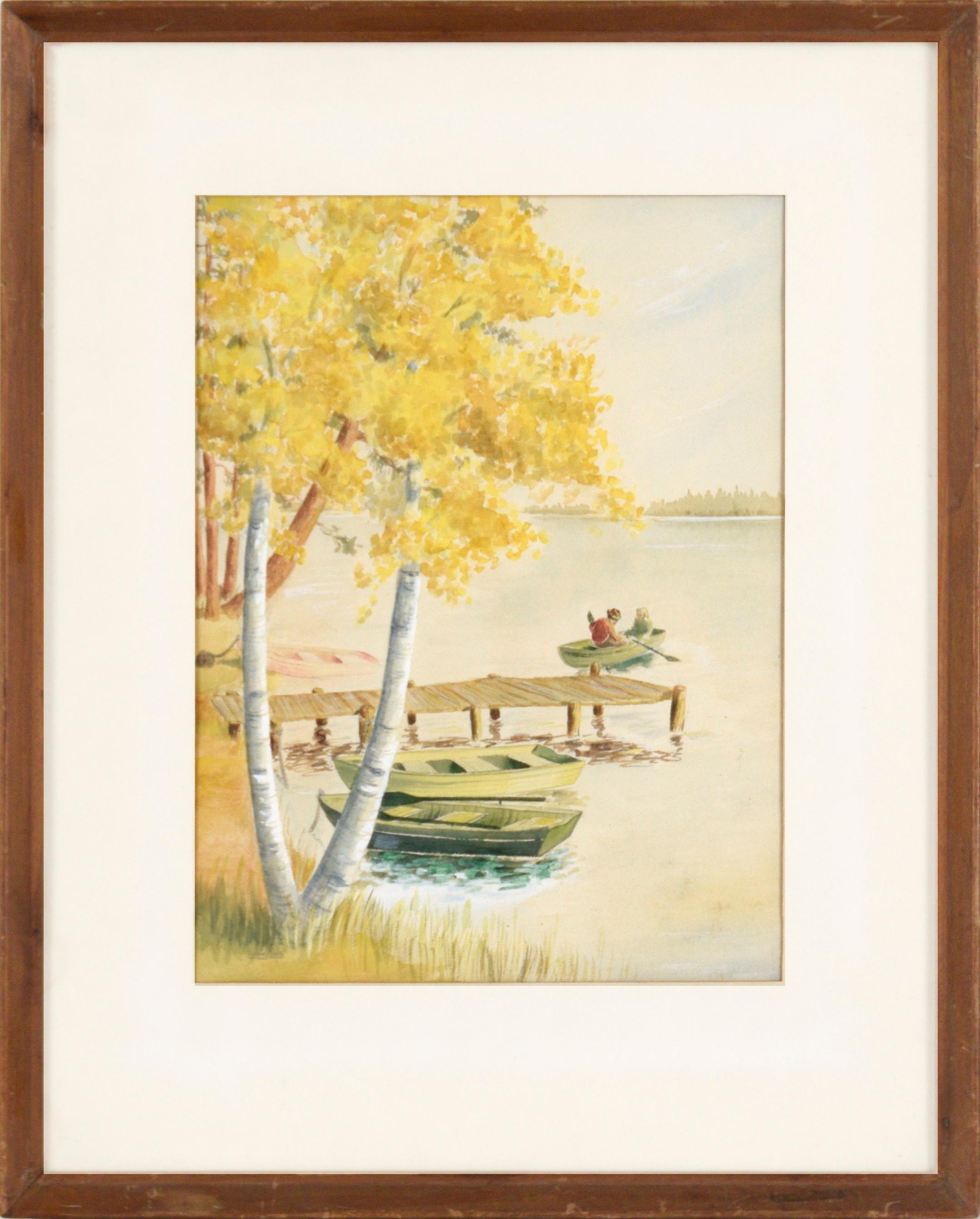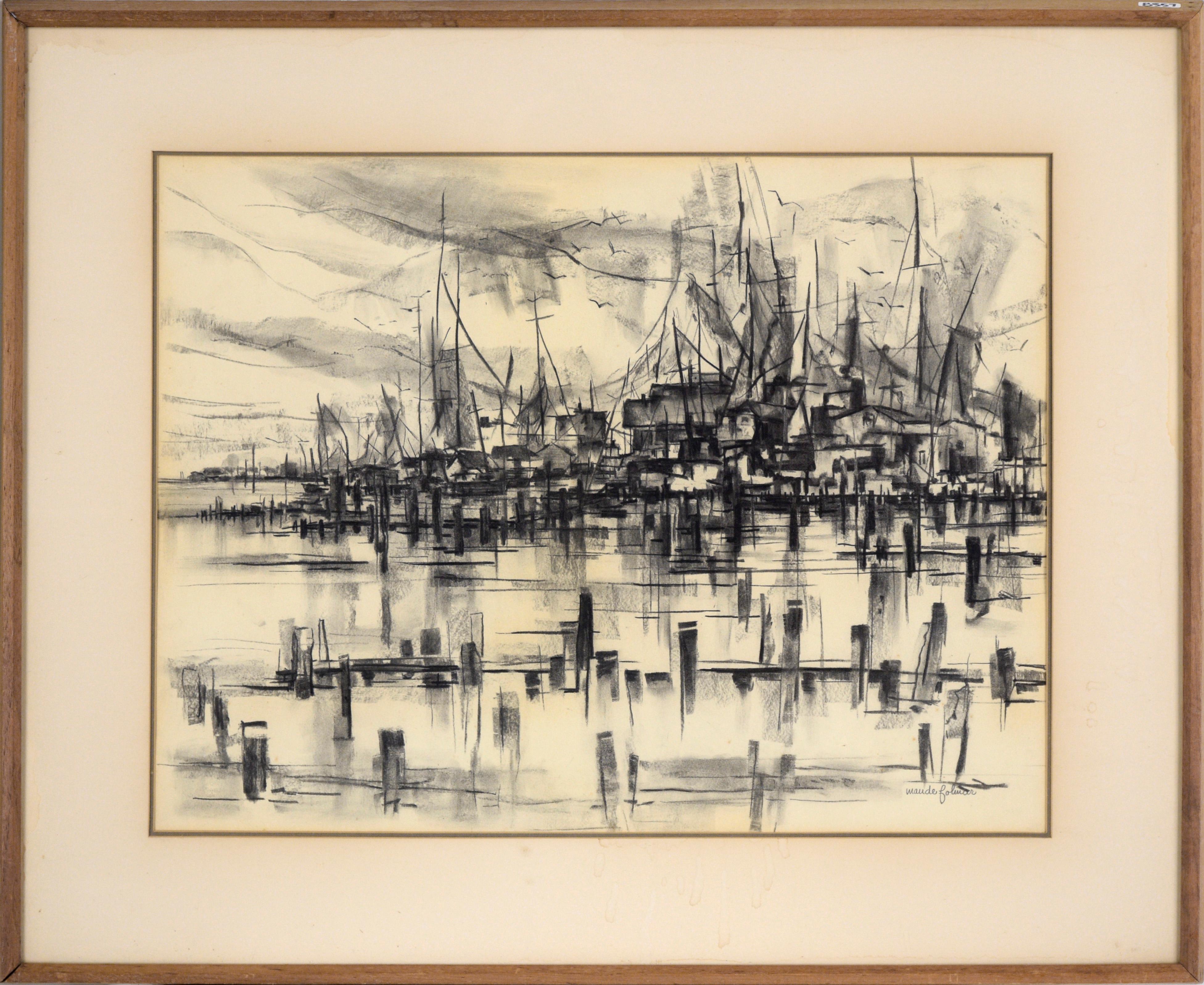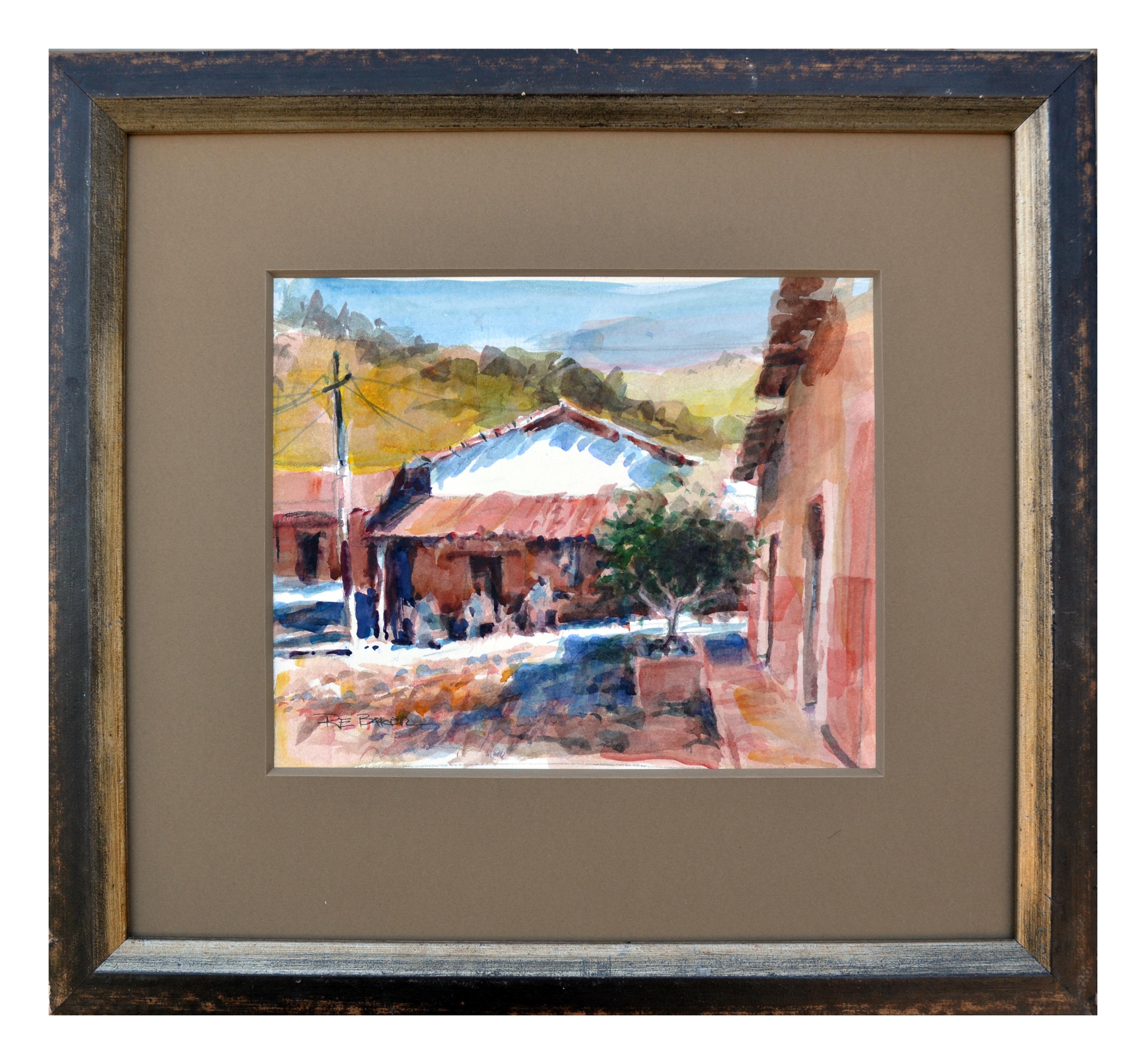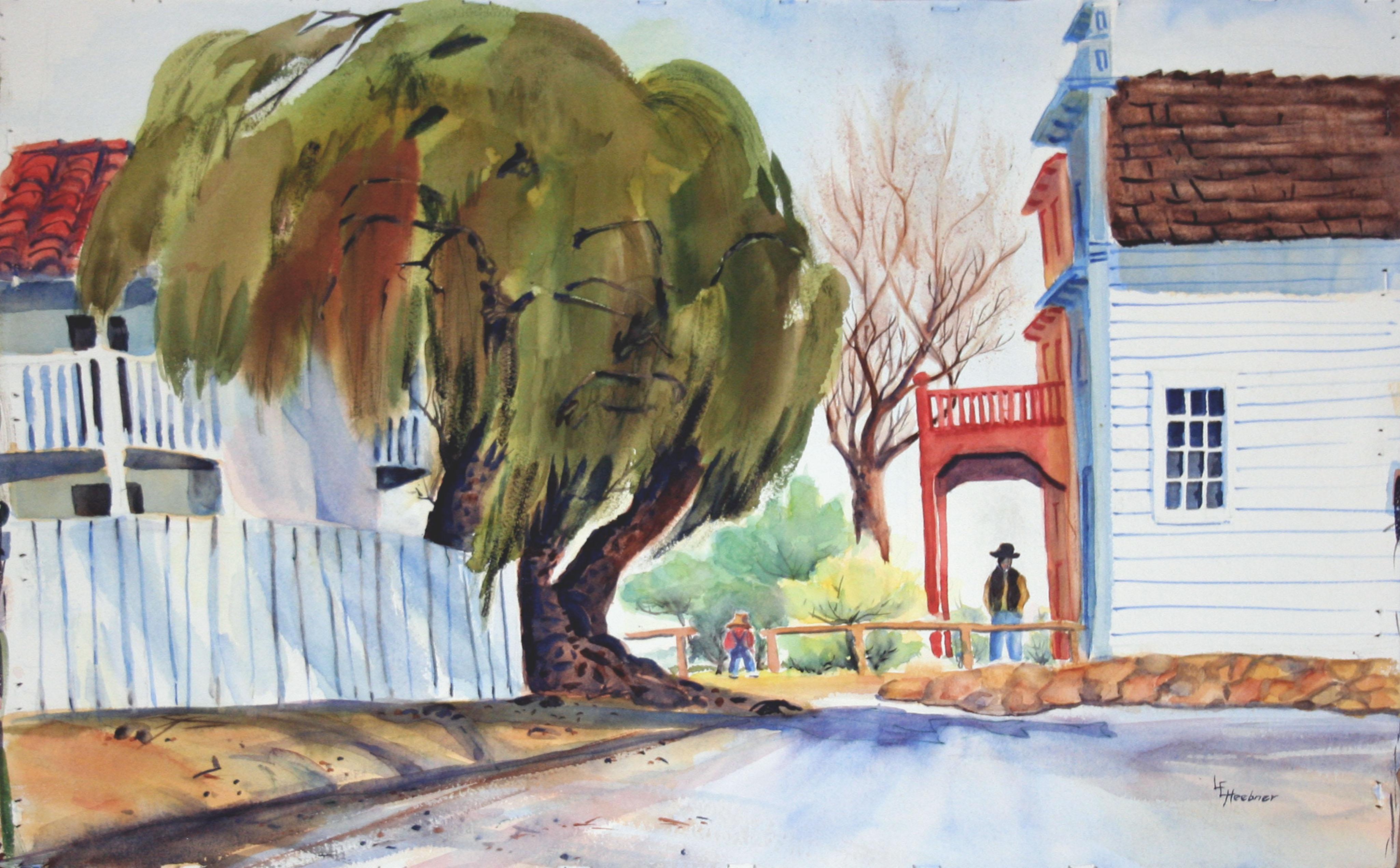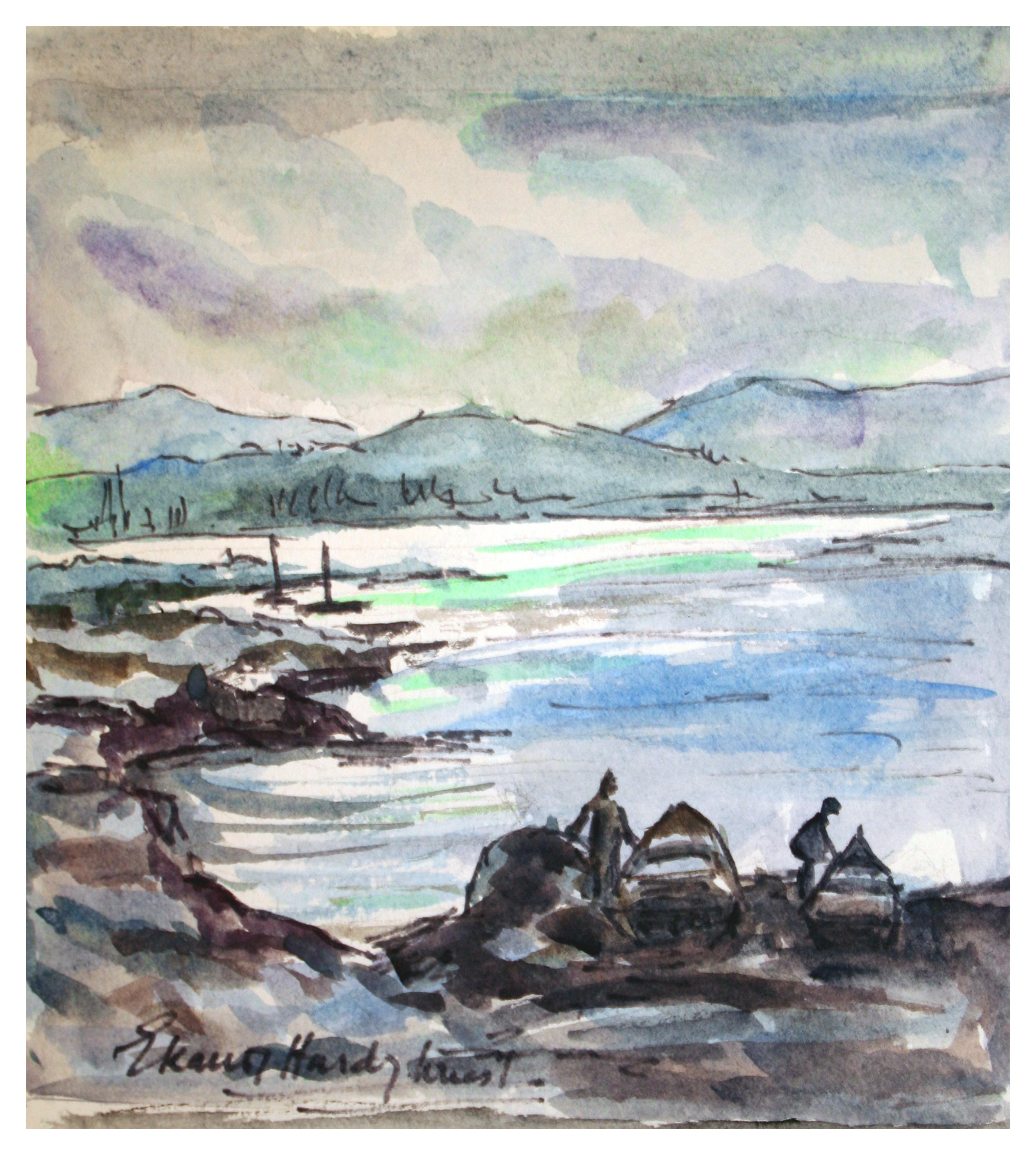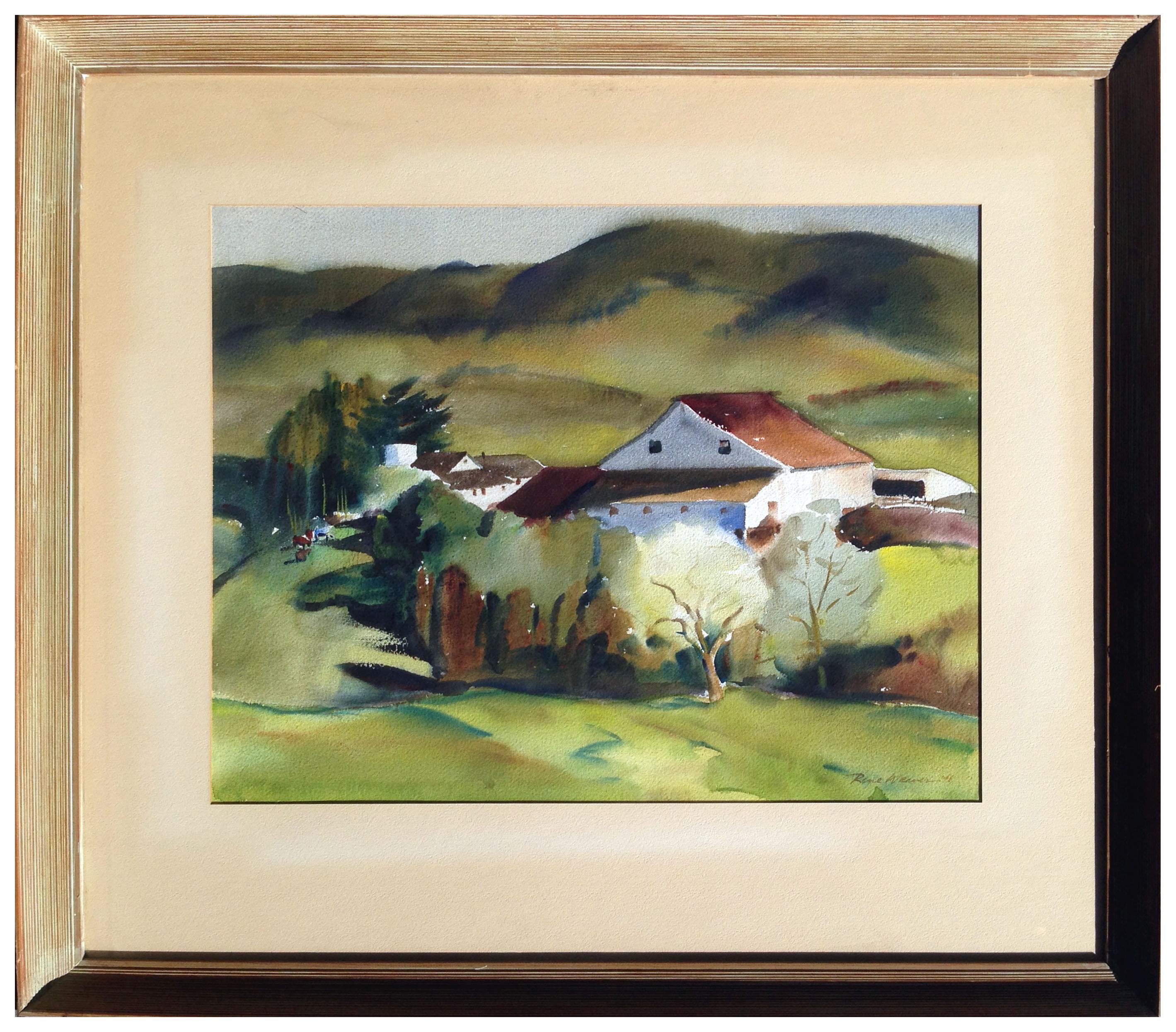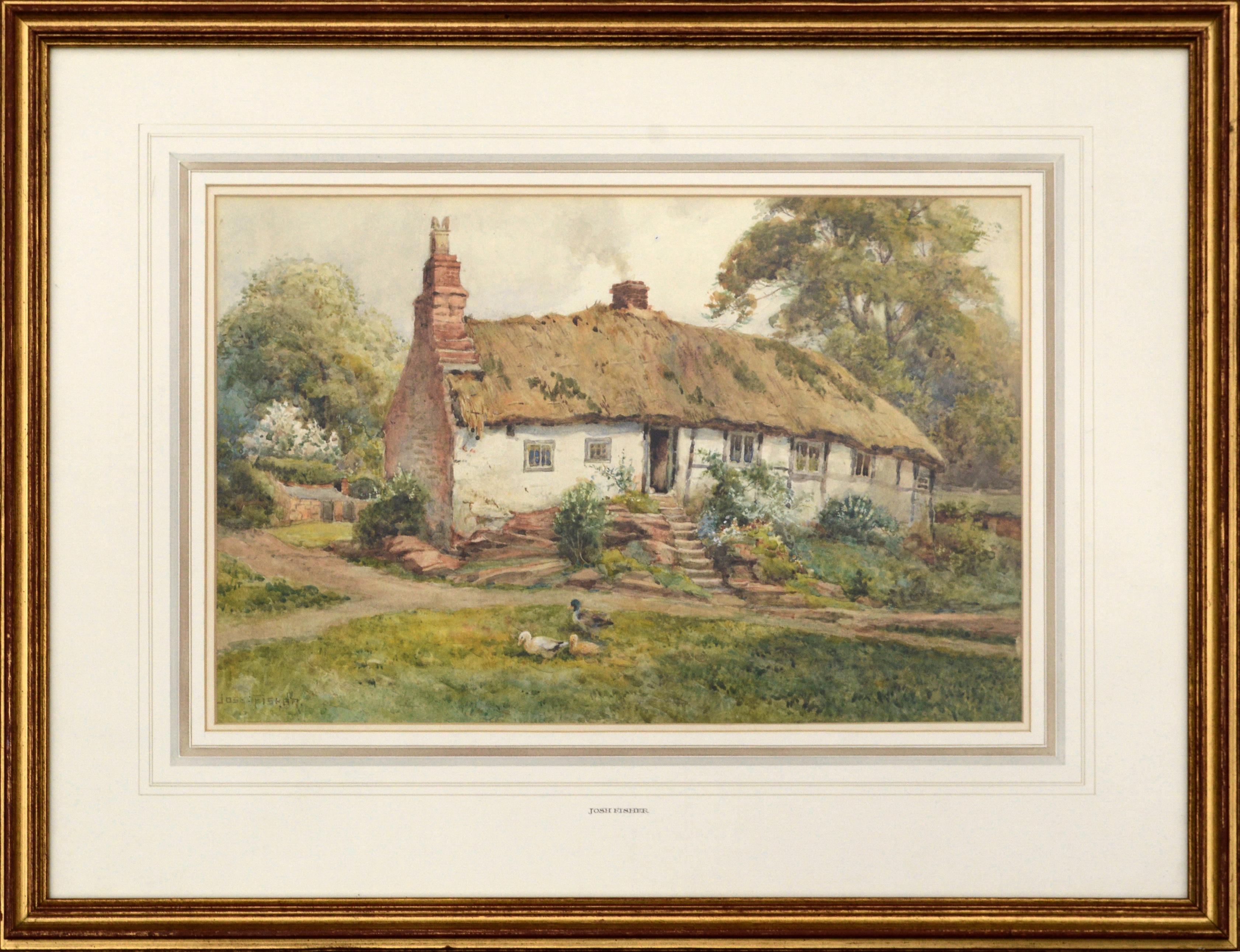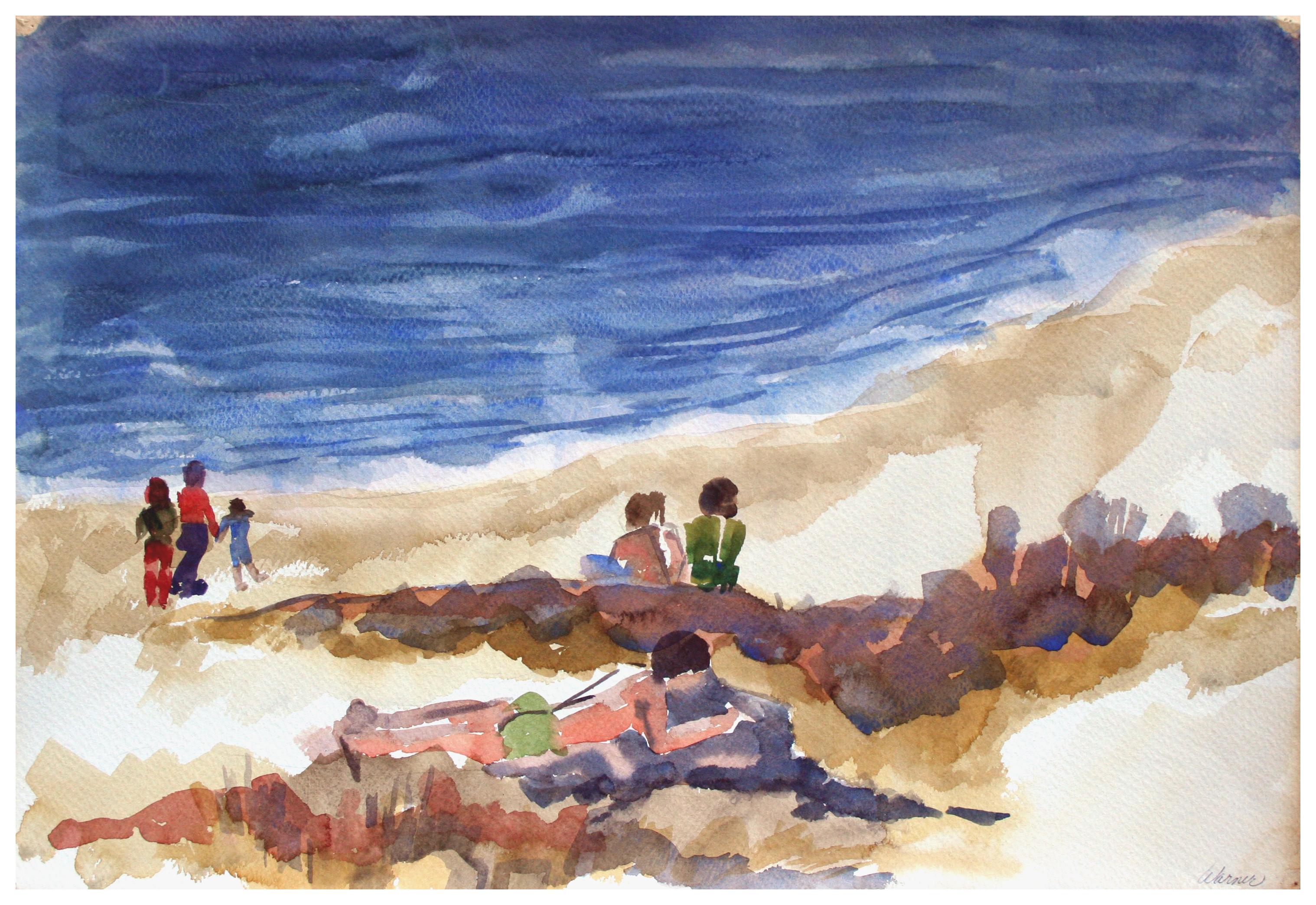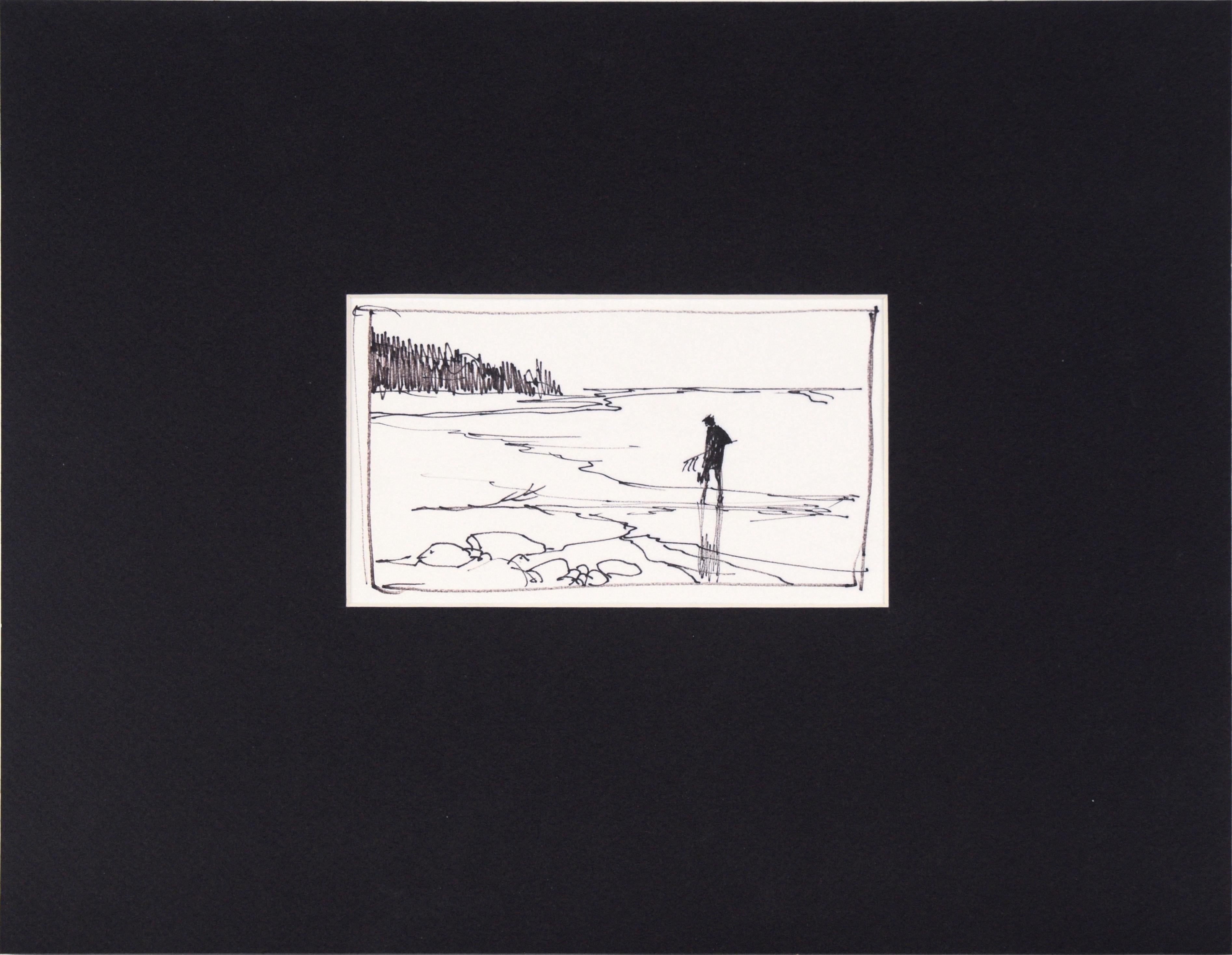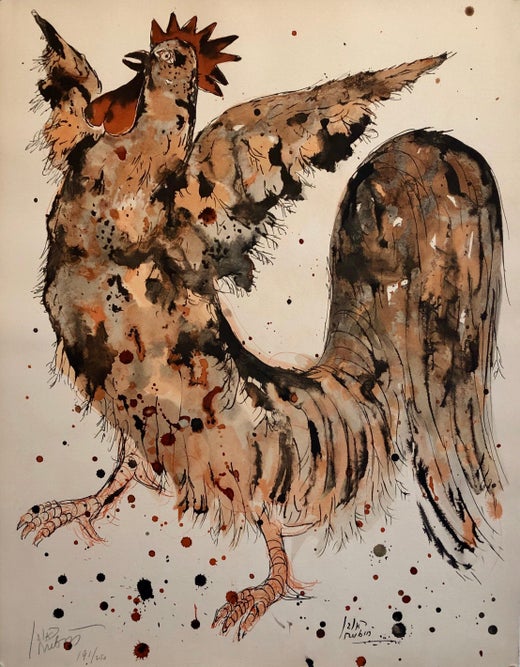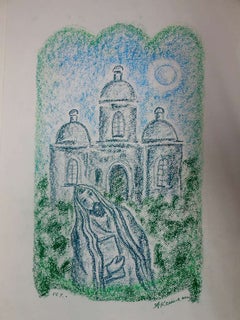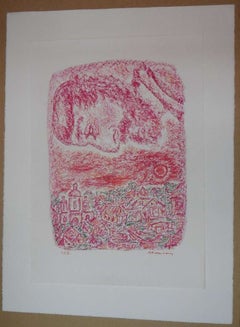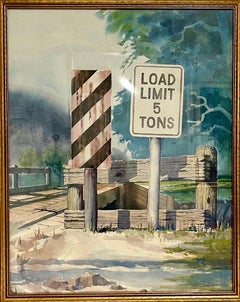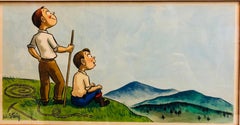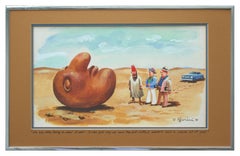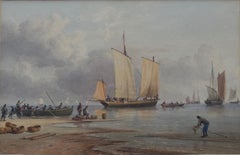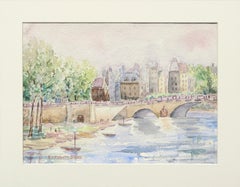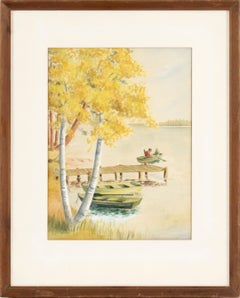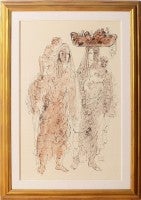
Rare Israeli Reuven Rubin watercolor painting Bezalel school
View Similar Items
Want more images or videos?
Request additional images or videos from the seller
1 of 9
Reuven RubinRare Israeli Reuven Rubin watercolor painting Bezalel school
About the Item
- Creator:Reuven Rubin (1893 - 1974, Israeli)
- Dimensions:Height: 36 in (91.44 cm)Width: 25.5 in (64.77 cm)
- Period:
- Condition:excellent. frame with some minor loss to gilding minor wear and tear.
- Gallery Location:Surfside, FL
- Reference Number:1stDibs: G14030538213
Reuven Rubin
Reuven Rubin- (November 13, 1893 - October 13, 1974) was a Romanian-born Israeli painter and Israel's first ambassador to Romania. Rubin Zelicovici (later Reuven Rubin) was born in Galaţi to a poor Romanian Jewish Hasidic family. He was the eighth of 13 children. In 1912, he left for Ottoman-ruled Palestine to study art at Bezalel Academy of Art and Design in Jerusalem. Finding himself at odds with the artistic views of the Academy's teachers, he left for Paris, France, in 1913 to pursue his studies at the École Nationale Supérieure des Beaux-Arts. At the outbreak of World War I, he was returned to Romania, where he spent the war years.
In 1921, he traveled to the United States with his friend and fellow artist, Arthur Kolnik, with whom he had shared a studio in Cernăuţi. In New York City, the two met artist Alfred Stieglitz, who was instrumental in organizing their first American show at the Anderson Gallery. Following the exhibition, in 1922, they both returned to Europe. In 1923, Rubin emigrated to Mandate Palestine.
Rubin met his wife, Esther, in 1928, aboard a passenger ship to Palestine on his return from a show in New York. She was a Bronx girl who had won a trip to Palestine in a Young Judea competition. He died in 1974.
About the Seller
4.9
Platinum Seller
Premium sellers with a 4.7+ rating and 24-hour response times
Established in 1995
1stDibs seller since 2014
1,766 sales on 1stDibs
Typical response time: 1 hour
Authenticity Guarantee
In the unlikely event there’s an issue with an item’s authenticity, contact us within 1 year for a full refund. DetailsMoney-Back Guarantee
If your item is not as described, is damaged in transit, or does not arrive, contact us within 7 days for a full refund. Details24-Hour Cancellation
You have a 24-hour grace period in which to reconsider your purchase, with no questions asked.Vetted Professional Sellers
Our world-class sellers must adhere to strict standards for service and quality, maintaining the integrity of our listings.Price-Match Guarantee
If you find that a seller listed the same item for a lower price elsewhere, we’ll match it.Trusted Global Delivery
Our best-in-class carrier network provides specialized shipping options worldwide, including custom delivery.More From This Seller
View AllShtetl Scene with Synagogue "Prayer"
By Anatoli Lvovich Kaplan
Located in Surfside, FL
Pastel or Tempera on paper. Judaica Shtetl scene of village. A Jew with Talith and Tefillin in front of the Synagogue.
Anatoli Lwowitch Kaplan was a Russian painter, sculptor and pri...
Category
20th Century Modern Landscape Drawings and Watercolors
Materials
Pastel, Tempera
Pastel on paper Shtetl Scene
By Anatoli Lvovich Kaplan
Located in Surfside, FL
Pastel or Tempera on paper. Judaica Shtetl scene of village.
Anatoli Lwowitch Kaplan was a Russian painter, sculptor and printmaker, whose works often reflect his Jewish origins.
h...
Category
20th Century Modern Figurative Drawings and Watercolors
Materials
Pastel
Watercolor Painting Road Signs, Load Limit, Aaron Bohrod WPA Artist Chicago Art
By Aaron Bohrod
Located in Surfside, FL
Aaron Bohrod (1907-1992)
Listed Wisconsin WPA American Artist
Original Watercolor Painting
Hand signed "Load Limit Bridge"
Dimensions: 24"x18" inches
Aaron Bohrod (1907 – 1992) was an American artist best known for his trompe-l'œil still-life paintings. This one presages Pop Art with its depiction of road signs.
Bohrod was born in Chicago in 1907, the son of an emigree Bessarabian-Jewish grocer. Bohrod studied at the School of the Art Institute of Chicago and the Art Students League of New York between 1926 and 1930. While at the Art Students League, Bohrod was influenced by John Sloan and chose themes that involved his own surroundings.
He returned to Chicago in 1930 where he painted views of the city and its working class. During the Great Depression, Schwartz became an artist on the Federal Art Project (WPA) payroll painting murals. He was one of the seven WPA artists who contributed to a mural at Riccardo's, Schwartz (Music), Malvin Albright (Sculpture), Ivan Albright (Drama), Aaron Bohrod (Architecture), Rudolph Weisenborn (Literature), Vincent D’Agostino (Painting), and Ric Riccardo (Dance).
Many well known Jewish and Immigrant artists worked for the Federal Art's Project (the New Deal) commonly referred to as the WPA, including Berenice Abbott, William Baziotes, William Gropper, Ilya Bolotowsky, Stuart Davis, Adolf Dehn, Ben Shahn and Louis Schanker. In 2002 Chicago philanthropist Seymour H. Persky acquired the murals for his personal collection. He eventually earned a Guggenheim Fellowships which permitted him to travel throughout the country, painting and recording the American scene. His early work won him widespread praise as an important social realist and regional painter and printmaker and his work was marketed through Associated American Artists in New York. Bohrod completed three commissioned murals for the Treasury Departments Section of Fine Arts in Illinois; Vandalia in 1935, Galesburg in 1938 and Clinton in 1939. During World War II, Bohrod worked as an artist; first in the Pacific for the United States Army Corps of Engineers' War Art Unit...
Category
Mid-20th Century American Modern Figurative Drawings and Watercolors
Materials
Watercolor
Whimsical Illustration Hiking Cartoon, 1938 Mt Tremblant Ski Lodge William Steig
By William Steig (b.1907)
Located in Surfside, FL
Lighthearted Illustration of Outdoor Pursuits This one being cross country hiking signed "W. Steig"
Provenance: from Mrs. Joseph B. Ryan, Commissioned by Joe Ryan for the bar at his ski resort, Mount Tremblant Lodge, in 1938.
Mont Tremblant, P.Q., Canada
Watercolor and ink on illustration board, sights sizes 8 1/2 x 16 1/2 in., framed.
In 1938 Joe Ryan, described as a millionaire from Philadelphia, bushwhacked his way to the summit of Mont Tremblant and was inspired to create a world class ski resort at the site. In 1939 he opened the Mont Tremblant Lodge, which remains part of the Pedestrian Village today. This original illustration is on Whatman Illustration board. the board measures 14 X 22 inches. label from McClees Galleries, Philadelphia, on the frame backing paper.
William Steig, 1907 – 2003 was an American cartoonist, sculptor, and, in his later life, an illustrator and writer of children's books. Best known for the picture books Sylvester and the Magic Pebble, Abel's Island, and Doctor De Soto, he was also the creator of Shrek!, which inspired the film series of the same name. He was the U.S. nominee for both of the biennial, international Hans Christian Andersen Awards, as a children's book illustrator in 1982 and a writer in 1988.
Steig was born in Brooklyn, New York in 1907, and grew up in the Bronx. His parents were Polish-Jewish immigrants from Austria, both socialists. His father, Joseph Steig, was a house painter, and his mother, Laura Ebel Steig, was a seamstress who encouraged his artistic leanings. As a child, he dabbled in painting and was an avid reader of literature. Among other works, he was said to have been especially fascinated by Pinocchio.He graduated from Townsend Harris High School at 15 but never completed college, though he attended three, spending two years at City College of New York, three years at the National Academy of Design and a mere five days at the Yale School of Fine Arts before dropping out of each.
Hailed as the "King of Cartoons" Steig began drawing illustrations and cartoons for The New Yorker in 1930, producing more than 2,600 drawings and 117 covers for the magazine. Steig, later, when he was 61, began writing children's books. In 1968, he wrote his first children's book. He excelled here as well, and his third book, Sylvester and the Magic Pebble (1969), won the Caldecott Medal. He went on to write more than 30 children's books, including the Doctor DeSoto series, and he continued to write into his nineties. Among his other well-known works, the picture book Shrek! (1990) formed the basis for the DreamWorks Animation film Shrek (2001). After the release of Shrek 2 in 2004, Steig became the first sole-creator of an animated movie franchise that went on to generate over $1 billion from theatrical and ancillary markets after only one sequel. Along with Maurice Sendak, Saul Steinberg, Ludwig Bemelmans and Laurent de Brunhofff his is one of those rare cartoonist whose works form part of our collective cultural heritage.
In 1984, Steig's film adaptation of Doctor DeSoto directed by Michael Sporn was nominated for the Academy Award for Best Animated Short Film. As one of the most admired cartoonists of all time, Steig spent seven decades drawing for the New Yorker magazine. He touched generations of readers with his tongue–in–cheek pen–and–ink drawings, which often expressed states of mind like shame, embarrassment or anger. Later in life, Steig turned to children's books, working as both a writer and illustrator.
Steig's children's books were also wildly popular because of the crazy, complicated language he used—words like lunatic, palsied, sequestration, and cleave. Kids love the sound of those words even if they do not quite understand the meaning. Steig's descriptions were also clever. He once described a beached whale as "breaded with sand."
Throughout the course of his career, Steig compiled his cartoons and drawings into books. Some of them were published first in the New Yorker. Others were deemed too dark to be printed there. Most of these collections centered on the cold, dark psychoanalytical truth about relationships. They featured husbands and wives fighting and parents snapping at their kids. His first adult book, Man About Town, was published in 1932, followed by About People, published in 1939, which focused on social outsiders. Sick of Each Other, published in 2000, included a drawing depicting a wife holding her husband at gunpoint, saying, "Say you adore me."
According to the Los Angeles Times, fellow New Yorker artist Edward Sorel...
Category
1930s Naturalistic Figurative Drawings and Watercolors
Materials
Archival Ink, Watercolor, Illustration Board
Whimsical Illustration Skiing Cartoon, 1938 Mt Tremblant Ski Lodge William Steig
By William Steig (b.1907)
Located in Surfside, FL
Lighthearted Illustration of Outdoor Pursuits This one being a Skiing scene, a boy and a girl on skis. signed W. Steig
Provenance: from Mrs. Joseph B. Ryan, Commissioned by Joe Ryan for the bar at his ski resort, Mount Tremblant Lodge, in 1938.
Mont Tremblant, P.Q., Canada
Watercolor and ink on illustration board, sights sizes 8 1/2 x 16 1/2 in., framed.
In 1938 Joe Ryan, described as a millionaire from Philadelphia, bushwhacked his way to the summit of Mont Tremblant and was inspired to create a world class ski resort at the site. In 1939 he opened the Mont Tremblant Lodge, which remains part of the Pedestrian Village today. This original illustration is on Whatman Illustration board. the board measures 14 X 22 inches. label from McClees Galleries, Philadelphia, on the frame backing paper.
William Steig, 1907 – 2003 was an American cartoonist, sculptor, and, in his later life, an illustrator and writer of children's books. Best known for the picture books Sylvester and the Magic Pebble, Abel's Island, and Doctor De Soto, he was also the creator of Shrek!, which inspired the film series of the same name. He was the U.S. nominee for both of the biennial, international Hans Christian Andersen Awards, as a children's book illustrator in 1982 and a writer in 1988.
Steig was born in Brooklyn, New York in 1907, and grew up in the Bronx. His parents were Polish-Jewish immigrants from Austria, both socialists. His father, Joseph Steig, was a house painter, and his mother, Laura Ebel Steig, was a seamstress who encouraged his artistic leanings. As a child, he dabbled in painting and was an avid reader of literature. Among other works, he was said to have been especially fascinated by Pinocchio.He graduated from Townsend Harris High School at 15 but never completed college, though he attended three, spending two years at City College of New York, three years at the National Academy of Design and a mere five days at the Yale School of Fine Arts before dropping out of each.
Hailed as the "King of Cartoons" Steig began drawing illustrations and cartoons for The New Yorker in 1930, producing more than 2,600 drawings and 117 covers for the magazine. Steig, later, when he was 61, began writing children's books. In 1968, he wrote his first children's book. He excelled here as well, and his third book, Sylvester and the Magic Pebble (1969), won the Caldecott Medal. He went on to write more than 30 children's books, including the Doctor DeSoto series, and he continued to write into his nineties. Among his other well-known works, the picture book Shrek! (1990) formed the basis for the DreamWorks Animation film Shrek (2001). After the release of Shrek 2 in 2004, Steig became the first sole-creator of an animated movie franchise that went on to generate over $1 billion from theatrical and ancillary markets after only one sequel. Along with Maurice Sendak, Saul Steinberg, Ludwig Bemelmans and Laurent de Brunhofff his is one of those rare cartoonist whose works form part of our collective cultural heritage.
In 1984, Steig's film adaptation of Doctor DeSoto directed by Michael Sporn was nominated for the Academy Award for Best Animated Short Film. As one of the most admired cartoonists of all time, Steig spent seven decades drawing for the New Yorker magazine. He touched generations of readers with his tongue–in–cheek pen–and–ink drawings, which often expressed states of mind like shame, embarrassment or anger. Later in life, Steig turned to children's books, working as both a writer and illustrator.
Steig's children's books were also wildly popular because of the crazy, complicated language he used—words like lunatic, palsied, sequestration, and cleave. Kids love the sound of those words even if they do not quite understand the meaning. Steig's descriptions were also clever. He once described a beached whale as "breaded with sand."
Throughout the course of his career, Steig compiled his cartoons and drawings into books. Some of them were published first in the New Yorker. Others were deemed too dark to be printed there. Most of these collections centered on the cold, dark psychoanalytical truth about relationships. They featured husbands and wives fighting and parents snapping at their kids. His first adult book, Man About Town, was published in 1932, followed by About People, published in 1939, which focused on social outsiders. Sick of Each Other, published in 2000, included a drawing depicting a wife holding her husband at gunpoint, saying, "Say you adore me."
According to the Los Angeles Times, fellow New Yorker artist Edward Sorel...
Category
1930s Naturalistic Figurative Drawings and Watercolors
Materials
Archival Ink, Watercolor, Illustration Board
Whimsical Illustration "Snow" Cartoon, 1938 Mt Tremblant Ski Lodge William Steig
By William Steig (b.1907)
Located in Surfside, FL
Lighthearted Illustration of Outdoor Pursuits This one being cross country Snow Shoes signed "W. Steig"
Provenance: from Mrs. Joseph B. Ryan, Commissioned by ...
Category
1930s American Modern Figurative Drawings and Watercolors
Materials
India Ink, Watercolor, Illustration Board
You May Also Like
Art Critics and Tourists, Original Watercolor Illustration for The New Yorker
By Eldon Dedini
Located in Soquel, CA
Art Critics and Tourists, Original Watercolor Illustration for The New Yorker
An original watercolor illustration for The New Yorker...
Category
1980s Pop Art Figurative Drawings and Watercolors
Materials
Paper, Watercolor
$1,100 Sale Price
20% Off
John Cantiloe Joy, 19th Century seascape, maritime interest
Located in Harkstead, GB
A wonderful example of the rare and intricate work of John Cantiloe Joy (1806-1866)
Shipping off the Norfolk coast with figures on the shore
Watercolour over traces of pencil
6½ x 1...
Category
19th Century Victorian Landscape Drawings and Watercolors
Materials
Paper, Watercolor
Bridge over the Canal - Landscape
By Elizabeth Stiles
Located in Soquel, CA
Detailed watercolor by Elizabeth Stiles (20th Century). Signed "Elizabeth Stiles" in the lower left corner. Presented in a new antuque white mat. No frame. Image size: 11"H x 15.25"W
Category
Late 20th Century Impressionist Landscape Drawings and Watercolors
Materials
Paper, Watercolor
Rowboat Outing - Fall Landscape with Rowboats in Watercolor on Paper
Located in Soquel, CA
Rowboat Outing - Fall Landscape with Rowboats in Watercolor on Paper
Serene lakeside landscape by an unknown artist (20th Century). Two birch trees with bright yellow leaves are gro...
Category
Mid-20th Century American Impressionist Landscape Drawings and Watercolors
Materials
Paper, Watercolor
Ships at the Harbor - Nautical Seascape with Seagulls in Charcoal on Paper
Located in Soquel, CA
Ships at the Harbor - Nautical Seascape in Charcoal on Paper
Detailed and layered harbor scene by Maude Folmar Ramsey (American, 1908-1993). The viewer is looking out at the harbor, across the water from the docks, buildings, and ships. The pillars, buildings, and masts are jumbled together in a pleasing manner that is almost abstract. Despite the simplified shapes, this piece is full of detail. This piece is executed in a rectilinear style frequently seen in American mid-century modern compositions.
Signed in the lower right corner "Maude Folmar"
Presented in a wood frame with a double mat.
Frame size: 25.25"H x 29.25"W
Image size: 17"H x 21.5"W
Maude Love (Folmar) Ramsey (American, 1908-1993) studied at the School of Fine Arts at Washington University in St. Louis, Missouri. She was the director of the Laguna Gloria Art Museum from 1968-1972. Ramsey was one of the charter members of the “Waterloo...
Category
Mid-20th Century American Impressionist Landscape Drawings and Watercolors
Materials
Paper, Charcoal
California Gold Town, Small-Scale Vintage Figurative Landscape Watercolor
Located in Soquel, CA
Charming small-scale watercolor painting of figures sitting outside an old building in a small California gold town by R. E. Baker (American, 20th Century). The warm color palette of...
Category
Late 20th Century American Impressionist Figurative Drawings and Waterco...
Materials
Paper, Watercolor
